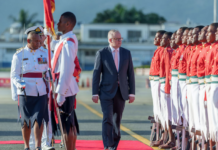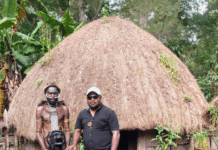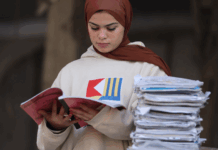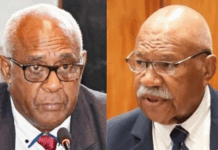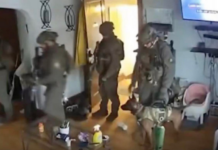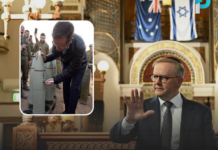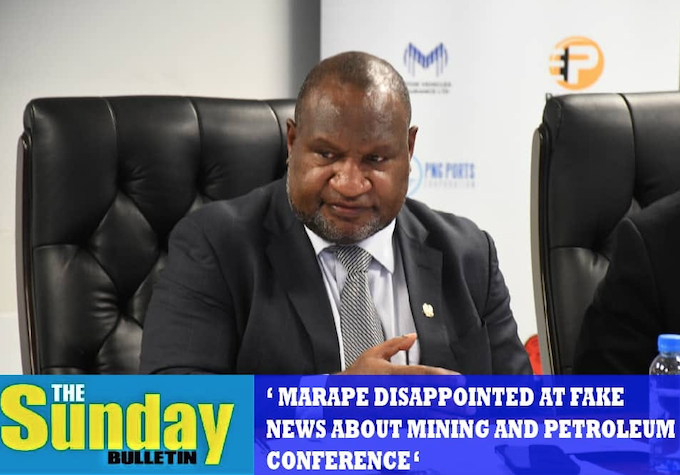
Papua New Guinea’s Prime Minister James Marape says it is very disappointing that foreign-owned media in the country continue to run “fake news”.
He said this after an editorial in the Malaysian-owned National on Wednesday claimed that former Australian Foreign Minister Julie Bishop had “rubbished” Papua New Guinea at the PNG Mining and Petroleum Conference in Sydney this week.
“Nothing could be further from the truth,” said Marape, who attended the Sydney conference on Monday.
- READ MORE: Stay home and clean up – The National
- Other PNG media reports
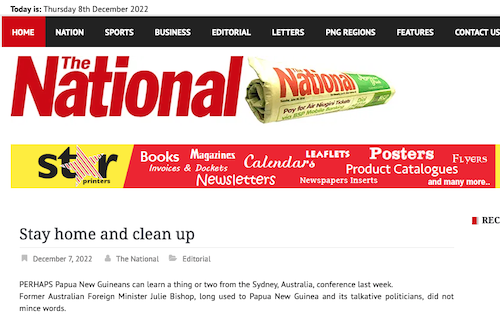
“The people of Australia and PNG demand an apology from The National for what seems to be a deliberate attempt to damage good relations between our two countries,” he said.
“Even PNG Chamber of Mines and Petroleum president Anthony Smaré, who organised the conference, is bewildered at where The National got this information from.
“Such lies, propagated by foreign-owned media in PNG, will only damage the good relations between Australia and PNG that have existed long before they came in.
“The 1000-plus people who packed the Hilton Hotel in Sydney never heard a bad word from Julie Bishop, who even after leaving politics, continues to be a very good friend of PNG.
‘Selling point for PNG’
“Her speech at the conference on Monday was a selling point for PNG.”
Prime Minister Marape was also disappointed that people of PNG believed the National editorial.
“It is also very disappointing that Papua New Guineans, even the well-educated ones, believed The National editorial which spread like wildfire on social media,” he said.
“Those many good Papua New Guineans in Sydney on Monday for the conference will dispel this myth.”
Marape said he had never controlled media in PNG, which is mostly foreign-owned, since becoming Prime Minister in 2019.
“Never once did I budge into newsrooms at late hours or call editors, like my predecessor Peter O’Neill was known for, and demand that news stories be pulled down,” he said.
“These foreign-owned media should be grateful for this and tell the truth, rather than lies, about a country in which you are a guest.
“My government will be encouraging more PNG ownership of mainstream media in 2023 and beyond.”
The editorial in The National, owned by the Malaysian logging company Rimbunan Hijau, said on 7 December 2022:
Stay home and clean up
Perhaps Papua New Guineans can learn a thing or two from the Sydney, Australia, conference last week.
 Former Australian Foreign Minister Julie Bishop, long used to Papua New Guinea and its talkative politicians, did not mince words.
Former Australian Foreign Minister Julie Bishop, long used to Papua New Guinea and its talkative politicians, did not mince words.
She fairly told Papua New Guinea: “Stop begging for aid.
“Stop begging for investment.
“You have been independent 47 long years.
“You have sufficient resources.
“About time you did something of your own.”
That would have been sobering.
Lesson one – Stop begging for aid.
At the last review of Australia’s aid to PNG, the aid bill from that direction had reached K28 billion [NZ$12.5 billion].
That amount will easily now be up to K50 billion.
What lasting infrastructure has the aid money built?
What import replacement industry has aid assisted in standing up?
How has aid fared in lowering infant and maternal mortality or reduced poverty or improved living standards.
These are quantifiable and verifiable factors on the human and economic indexes.
If the present indexes are negligible or dropping, then the most important question of all is: Where has all the aid money gone?
Lesson two: Stop begging for investment.
You attract foreign direct investment by the incentives you offer, by the taxation regime you have, by the stable political climate you offer and security for investment and safety of employees that is in place.
Do not go on foreign investment missions until these issues are sorted out at home.
Do not go ask for investors if you have not started up Wafi Golpu, Papua LNG, Pnyang LNG and Porgera gold mine.
Nobody is blind or a fool.
Everybody is well aware what goes on in PNG.
Lesson three: Think trade, not aid or loans.
When you think in that direction you think about what you must grow or produce at home for trade.
You must think markets, volumes, quality and sustainability.
You must think about local manufacturing industries and growth of service industries.
Lesson four: Enough talking, time for action.
Do we need to even need an explanation for this last lesson?
When you look at the lessons proffered here, you can easily see that much of the things that need doing must be done in the country.
Even PNG’s neighbours are tiring of hearing PNG talking about this plan or that plan or whatever other plan without seeing any of the plans bearing fruit.
Since Somare broached the 8-Point Plan in 1973 and the five National goals and Directive Principles have been written into the Preamble of the National Constitution, PNG has been planning forever but never getting up to work the plans.
It has been forever asking others to do the things it itself seems loathe to do.
These others, Australia being a principal partner in this, are now telling us: enough is enough.
It is time the globe-trotting ceased and the trips to expos stopped.
Putting Julie Bishop in the line-up of speakers also means the conference organisers thought the time was ripe for some straight talking.
Stay home and clean up the backyard.
This media report is made up – it does not contain one actual quotation from my speech! The audience – mostly from PNG – can verify that I did not say this. 🤷♀️ https://t.co/eKZpBKbJvT
— Julie Bishop (@HonJulieBishop) December 8, 2022


